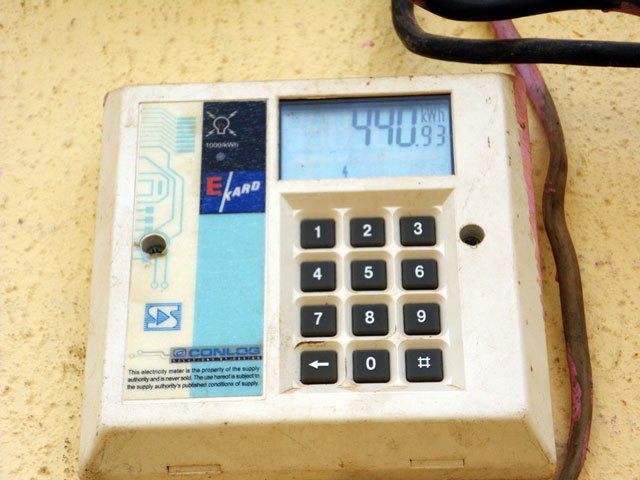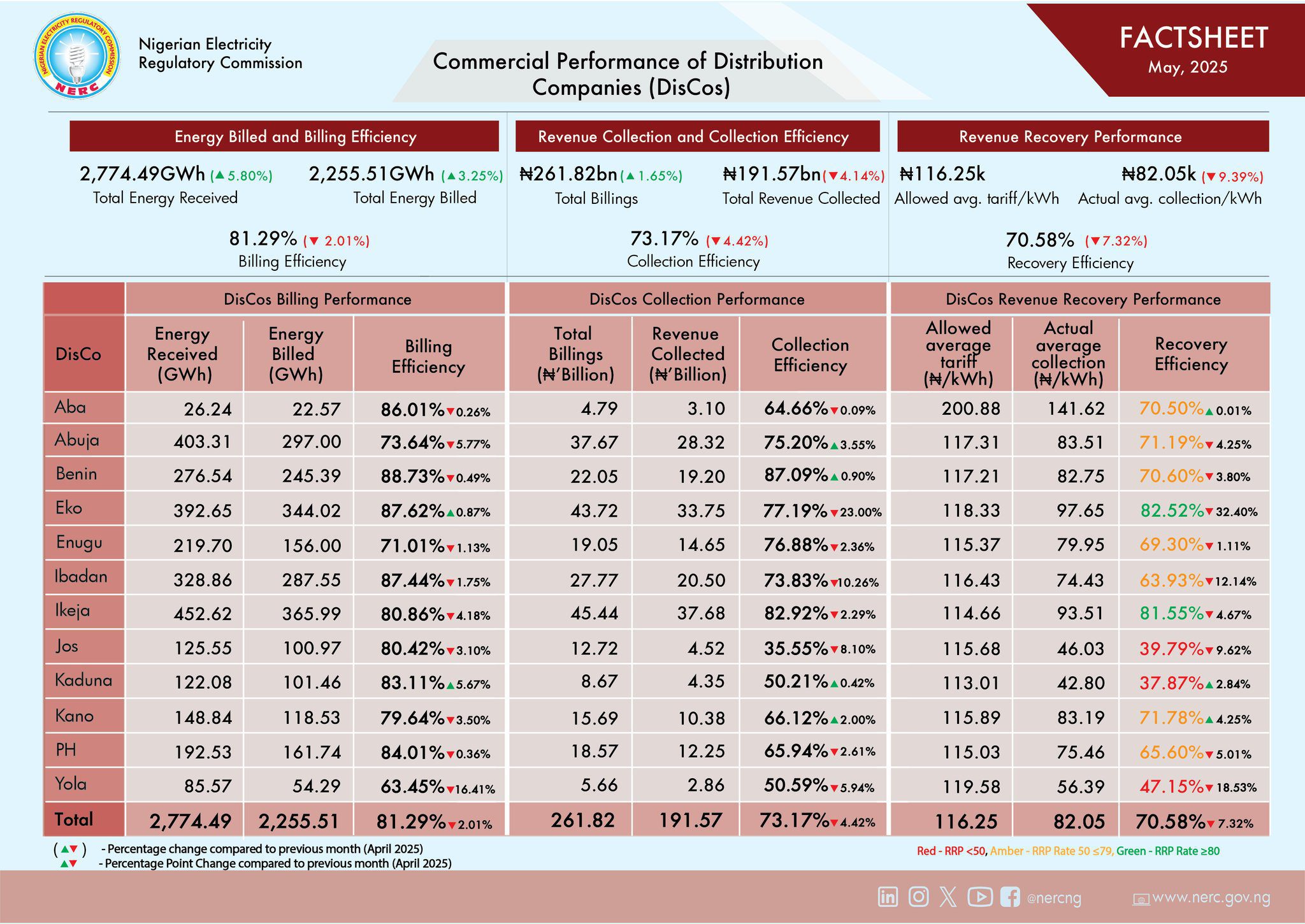



































DisCos rake in ₦191.57 billion in May as Abuja tops Eko and Ikeja – NERC report
The Nigerian Electricity Regulatory Commission (NERC) has released its latest factsheet for May 2025. According to the report, the total billed amount by Nigeria’s 11 electricity Distribution Companies (DisCos) hit ₦261.82 billion. However, only ₦191.57 billion was collected, resulting in a collection efficiency of 73.17%, representing a 4.42% spike from April. Published on July 28, 2025, the report provides a detailed breakdown of billing efficiency, revenue collection, and recovery performance across the country.
The May 2025 factsheet is part of NERC’s ongoing efforts to monitor DisCos, which are tasked with delivering electricity to millions of households and businesses nationwide. The data serves as a vital tool for understanding the sector’s operational health and guiding future improvements.

Other key findings on DISCOs operations in May 2025
The report evaluates DisCos across three critical metrics: energy billed and billing efficiency, revenue collection and collection efficiency, and revenue recovery performance.
– Energy billed and billing efficiency: DisCos billed 2,255.51 GWh out of the 2,774.49 GWh received, achieving a billing efficiency of 81.29%. This represents a marginal decline of 0.01% compared to April 2025, suggesting potential challenges in metering or billing processes.
– Revenue collection: The total billed amount reached ₦261.82 billion, with ₦191.57 billion collected, resulting in a collection efficiency of 73.17%. This marks a notable 4.42% increase from the previous month, indicating improved revenue recovery efforts.
– Revenue recovery: The average tariff was set at ₦116.25 per kWh, with an actual collection of ₦82.05 per kWh. This translates to a recovery efficiency of 70.58%, a significant 7.32% rise from April 2025.
Individual DisCo performances reveal stark contrasts. Abuja DisCo emerged as a top performer, boasting a billing efficiency of 73.64% and a collection efficiency of 75.20%. Conversely, Yola DisCo lagged with a billing efficiency of 63.45% and a collection efficiency of 50.59%.

Recovery efficiency varied widely, ranging from 39.79% for Jos DisCo to 82.52% for Eko DisCo. These disparities highlight the uneven development across Nigeria’s electricity distribution landscape.
Crunching the data
The slight dip in billing efficiency (81.29%) raises questions about the accuracy of metering systems or the completeness of billing records. DisCos may need to invest in modernising infrastructure to address these gaps.
The rise in collection efficiency (73.17%) is encouraging, suggesting that some companies are enhancing their revenue collection strategies, possibly through better customer engagement or enforcement mechanisms.
High-performing DisCos like Ikeja (82.92% collection efficiency) and Eko (77.19%) likely benefit from robust infrastructure or higher compliance rates among consumers.
In contrast, underperformers like Yola and Jos may face challenges such as economic downturns, outdated equipment, or logistical issues. These regional differences underscore the need for tailored solutions to address specific local conditions.
Nigeria’s electricity sector has long struggled with systemic issues. Historical data indicates significant losses due to transmission inefficiencies and theft, though losses have decreased from 46.9% in 1996 to 9.4% in 2008. Vandalism, poor maintenance, and corruption continue to hinder progress. The May 2025 factsheet reflects these ongoing struggles, with low recovery rates in some areas signalling deeper structural problems.

The sector’s generation capacity stands at 11,165.4 MW from 23 power plants, yet demand far exceeds supply. This deficit forces many households and businesses to rely on private generators, adding to economic strain. NERC’s oversight aims to bridge this gap, but the success of these efforts depends on DisCos’ operational efficiency and investment in infrastructure.
The May 2025 factsheet highlights the urgency of targeted interventions. NERC must work closely with underperforming DisCos to improve billing accuracy, enhance collection rates, and upgrade ageing infrastructure. Investments in smart metering technology could streamline operations and reduce losses. Additionally, public awareness campaigns may encourage timely bill payments, boosting overall efficiency.
For the government, this data provides a roadmap for policy decisions. Strengthening regulatory enforcement and ensuring equitable tariff structures could address regional disparities.

